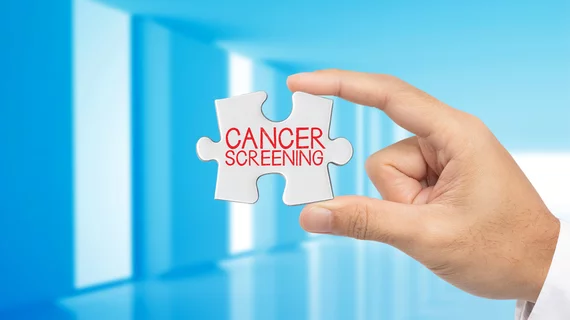Radiologists pilot one-stop-shop approach to boost imaging rates
Radiologists in Pennsylvania are piloting the use of a one-stop-shop approach to boost cancer screening rates in their community.
The University of Pennsylvania Health System set up this intervention through its longstanding partnership with a community organization. Its goal was to bring better cancer screening access to a West Philadelphia community that had historically faced barriers to care.
Radiologists led a multidisciplinary team that set up a community health fair, offering screening and other services related to prostate, colorectal, breast and lung cancer. Leaders say the approach is paying off, with 350 participants attending the health fair and 232 screening tests or assessments completed, according to a study published in Academic Radiology [1].
“Data from this event suggest that this inclusive approach, as well as the use of a health fair ‘passport’ to incentivize engagement, can successfully improve access to screening and follow-up in an underserved community,” radiologist Christine E. Edmonds, MD, with the University of Pennsylvania Health System, and co-authors wrote Sept. 13. “This ‘one-stop-shop’ community approach can be replicated by radiology-led teams in other settings as a high-value, scalable opportunity to reduce disparities in access to cancer screening,” they added.
Faculty and staff from the system worked with Community of Compassion, a “cornerstone” local institution with over 5,000 members, to develop priorities for the fair. They built on experience in running recent COVID-19 vaccination clinics along with initiatives to improve colon and breast cancer screening rates.
After six months of planning, they held the fair in June 2022 on the campus of a large community church following Sunday service. The fair was widely advertised in the month leading up to it, on social media, fliers and through a hospital press release. Volunteers aided in procuring supplies and running the fair, including 70 community members alongside patient registration associates, mammography technologists, registered nurses, IT specialists, financial counselors and phlebotomists.
Breast, colorectal and prostate cancer screening were all provided free of charge, with eligibility determined based on society guidelines. They utilized a mobile mammography united provided as an in-kind donation by Siemens Healthineers, with the machine available for two weeks afterward to spread out demand. Other exams included a fecal immunochemical test for colorecta cancer, blood draws for prostate cancer screening, and risk assessments for lung cancer. (The authors noted that on-site CT screening was deemed infeasible.) Other ancillary services also were offered, such as educational sessions on different cancer types and procuring health insurance.
Edmonds and colleagues also used a health fair “passport” to boost engagement. Attendees were able to earn stickers at each station and enter their card into a raffle to win a tablet or headphones, if they collected all eight. All told, the event cost about $15,000 to run, which does not count donations or the processing and interpretation of screening tests.
A total of 180 women underwent mammography, of whom 22% had never been screened previously. Twenty-one women (or 12%) were recalled for diagnostic breast imaging and 19 (90%) completed their evaluations. Another 10 were assessed for lung cancer, six were deemed eligible and three received their CT scan.
“With careful planning and partnership, health fairs focused on cancer screening provide a high-value opportunity to advance equity in cancer care and provide efficient comprehensive screening across multiple types of cancer to medically underserved communities,” the authors concluded. “Ensuring that community priorities are elicited and honored is critical to the success of such fairs. Decentralizing cancer screening out of clinics and into community overcomes many of the traditional barriers to screening, and broad multidisciplinary collaboration maximizes impact.”

